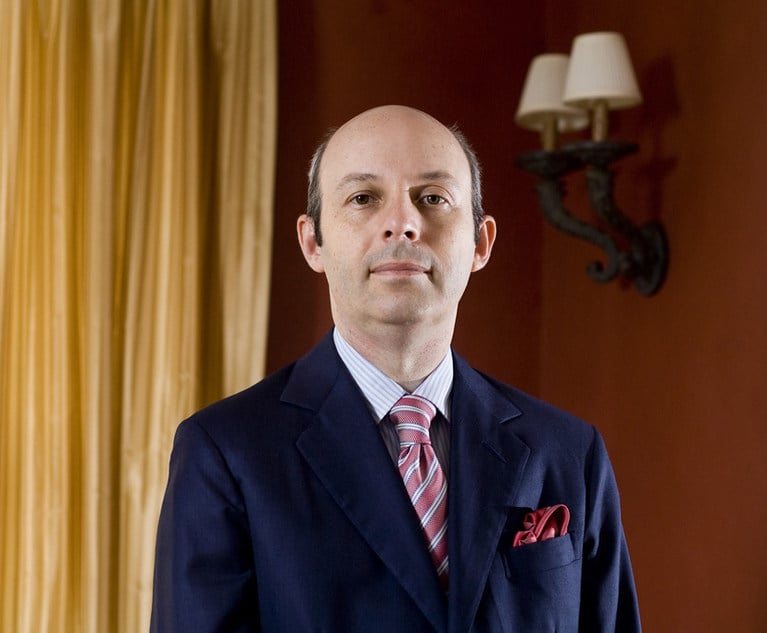 Bottom row (l-r): Justice Ricky Polston, Chief Justice Charles T. Canady, Justice Jorge Labarga. Top row (l-r): Justice John D. Couriel, Justice Alan Lawson, Justice Carlos G. Muñiz, Justice Jamie R. Grosshans.
Bottom row (l-r): Justice Ricky Polston, Chief Justice Charles T. Canady, Justice Jorge Labarga. Top row (l-r): Justice John D. Couriel, Justice Alan Lawson, Justice Carlos G. Muñiz, Justice Jamie R. Grosshans. Florida Justices Order New Trials for Death Row Inmates
In both cases, the Supreme Court found that judges made errors that required new trials.
January 14, 2022 at 10:26 AM
5 minute read
The Florida Supreme Court on Thursday ordered new trials for two Death Row inmates, including for a man convicted in the murders of a Broward County couple after his mother provided key testimony.
In somewhat-unusual moves, justices overturned the convictions of Peter Avsenew in the 2010 murders in Broward County and of Jason Simpson, who was convicted of killing a drug dealer and the dealer's pregnant girlfriend in 1999 in Duval County.
In both cases, the Supreme Court found that judges made errors that required new trials. Avsenew was sentenced to death in 2018, while Simpson was sentenced in 2007.
Avsenew was convicted in the shooting deaths of Steven Adams and Kevin Powell and taking the couple's sport-utility vehicle and money. Avsenew, who had been staying with the couple, drove to Polk County, where his mother, Jeanne Avsenew, lived.
After a series of circumstances, including Avsenew telling his mother he was driving a stolen SUV, she did a computer search and found that he was a "person of interest" in the murders, according to the Supreme Court ruling. She contacted police, and Avsenew was subsequently arrested.
But Thursday's ruling centered on video testimony of Jeanne Avsenew that was used in her son's trial. The appeal did not take issue with video testimony, which is allowed under a court rule if a witness is unable to attend a trial.
Justices, however, said the set-up of the equipment used in the testimony prevented Jeanne Avsenew from seeing her son. That violated a rule that says courts must "keep the defendant in the presence of the witness."
In the unanimous ruling, the Supreme Court said it "does not take lightly the impact of today's decision. However, the introduction of Ms. Avsenew's testimony constituted harmful error, and we are bound to rule in a manner that remedies such error."
"We cannot overstate the harmful effect of this testimony having come from not just anyone, but defendant Avsenew's own mother," the 16-page ruling said. "Indeed, the jury heard a recording of a phone call placed by Avsenew while he was in jail awaiting trial, wherein he mentioned that the 'lead witness against me is my mom.' Without question, the impact of Ms. Avsenew's incriminating testimony on the jury would have been even greater because she is Avsenew's mother. The state cannot demonstrate that there is no reasonable possibility that the testimony of Ms. Avsenew — a material state witness — contributed to the jury's guilty verdicts."
In the Duval County case, the Supreme Court said Simpson should receive a new trial because prosecutors did not disclose that a witness against him was a confidential informant for the state.
Simpson was convicted in the murders of drug dealer Archie Howard Crook and Crook's pregnant girlfriend, Kimberli Kimbler. They were hacked to death with an ax in the bedroom of their home, according to the Supreme Court ruling.
The witness whose work as an informant had not been disclosed was Crook's son, Archie Clyde Crook — identified in the ruling as "Little Archie." Simpson's defense attorneys argued during the trial that Little Archie had killed his father and Kimbler.
Little Archie had served as an informant against another man, George Michael Durrance, who was described in the ruling as being an associate of the Crook father and son and Simpson in the drug trade.
Durrance also was a figure in the Simpson murder case, and the Supreme Court, in a 5-1 decision, said Little Archie's role as a confidential informant should have been disclosed.
The majority opinion said the "relationship between Simpson, Little Archie, and Durrance was of critical importance in this case, and the information Little Archie provided to law enforcement pertaining to Durrance casts a different light on this relationship."
The opinion, shared by Justices Ricky Polston, Jorge Labarga, Alan Lawson, John Couriel and Jamie Grosshans, also said "Little Archie's testimony and credibility were of significant consequence when we consider the lack of evidence linking Simpson to the scene of the crime."
But Chief Justice Charles Canady dissented, writing that the failure to disclose the information about the informant "was not material and did not prejudice Simpson."
"The fact that Little Archie had been a source to law enforcement in unrelated matters is of little, if any, relevance, and in light of the other information known to the jury about Little Archie, would not have been an indication that he had a particular bias toward law enforcement or the state," Canady wrote. "There is no reasonable probability that had this information been disclosed to Simpson, the result of Simpson's trial would have been different."
Justice Carlos Muniz was recused from the case.
Simpson, now 48, and Avsenew, now 37, are inmates at Union Correctional Institution, according to the Florida Department of Corrections website.
NOT FOR REPRINT
© 2025 ALM Global, LLC, All Rights Reserved. Request academic re-use from www.copyright.com. All other uses, submit a request to [email protected]. For more information visit Asset & Logo Licensing.
You Might Like
View All
US Judge Cannon Blocks DOJ From Releasing Final Report in Trump Documents Probe
3 minute read
SCOTUSblog Co-Founder Tom Goldstein Misused Law Firm Funds, According to Federal Indictment
2 minute read
Automaker Pleads Guilty and Agrees to $1.6 Billion in Payouts

Read the Document: DOJ Releases Ex-Special Counsel's Report Explaining Trump Prosecutions
3 minute readTrending Stories
- 1Exits Leave American Airlines, SiriusXM, Spotify Searching for New Legal Chiefs
- 2Etsy App Infringes on Storage, Retrieval Patents, New Suit Claims
- 3The Secret Prior Art Problem Rears Its Ugly Head
- 4Four Things to Know About Florida’s New Law to Protect Minors Online
- 5US Supreme Court Considers Further Narrowing of Federal Fraud Statutes
Who Got The Work
J. Brugh Lower of Gibbons has entered an appearance for industrial equipment supplier Devco Corporation in a pending trademark infringement lawsuit. The suit, accusing the defendant of selling knock-off Graco products, was filed Dec. 18 in New Jersey District Court by Rivkin Radler on behalf of Graco Inc. and Graco Minnesota. The case, assigned to U.S. District Judge Zahid N. Quraishi, is 3:24-cv-11294, Graco Inc. et al v. Devco Corporation.
Who Got The Work
Rebecca Maller-Stein and Kent A. Yalowitz of Arnold & Porter Kaye Scholer have entered their appearances for Hanaco Venture Capital and its executives, Lior Prosor and David Frankel, in a pending securities lawsuit. The action, filed on Dec. 24 in New York Southern District Court by Zell, Aron & Co. on behalf of Goldeneye Advisors, accuses the defendants of negligently and fraudulently managing the plaintiff's $1 million investment. The case, assigned to U.S. District Judge Vernon S. Broderick, is 1:24-cv-09918, Goldeneye Advisors, LLC v. Hanaco Venture Capital, Ltd. et al.
Who Got The Work
Attorneys from A&O Shearman has stepped in as defense counsel for Toronto-Dominion Bank and other defendants in a pending securities class action. The suit, filed Dec. 11 in New York Southern District Court by Bleichmar Fonti & Auld, accuses the defendants of concealing the bank's 'pervasive' deficiencies in regards to its compliance with the Bank Secrecy Act and the quality of its anti-money laundering controls. The case, assigned to U.S. District Judge Arun Subramanian, is 1:24-cv-09445, Gonzalez v. The Toronto-Dominion Bank et al.
Who Got The Work
Crown Castle International, a Pennsylvania company providing shared communications infrastructure, has turned to Luke D. Wolf of Gordon Rees Scully Mansukhani to fend off a pending breach-of-contract lawsuit. The court action, filed Nov. 25 in Michigan Eastern District Court by Hooper Hathaway PC on behalf of The Town Residences LLC, accuses Crown Castle of failing to transfer approximately $30,000 in utility payments from T-Mobile in breach of a roof-top lease and assignment agreement. The case, assigned to U.S. District Judge Susan K. Declercq, is 2:24-cv-13131, The Town Residences LLC v. T-Mobile US, Inc. et al.
Who Got The Work
Wilfred P. Coronato and Daniel M. Schwartz of McCarter & English have stepped in as defense counsel to Electrolux Home Products Inc. in a pending product liability lawsuit. The court action, filed Nov. 26 in New York Eastern District Court by Poulos Lopiccolo PC and Nagel Rice LLP on behalf of David Stern, alleges that the defendant's refrigerators’ drawers and shelving repeatedly break and fall apart within months after purchase. The case, assigned to U.S. District Judge Joan M. Azrack, is 2:24-cv-08204, Stern v. Electrolux Home Products, Inc.
Featured Firms
Law Offices of Gary Martin Hays & Associates, P.C.
(470) 294-1674
Law Offices of Mark E. Salomone
(857) 444-6468
Smith & Hassler
(713) 739-1250






